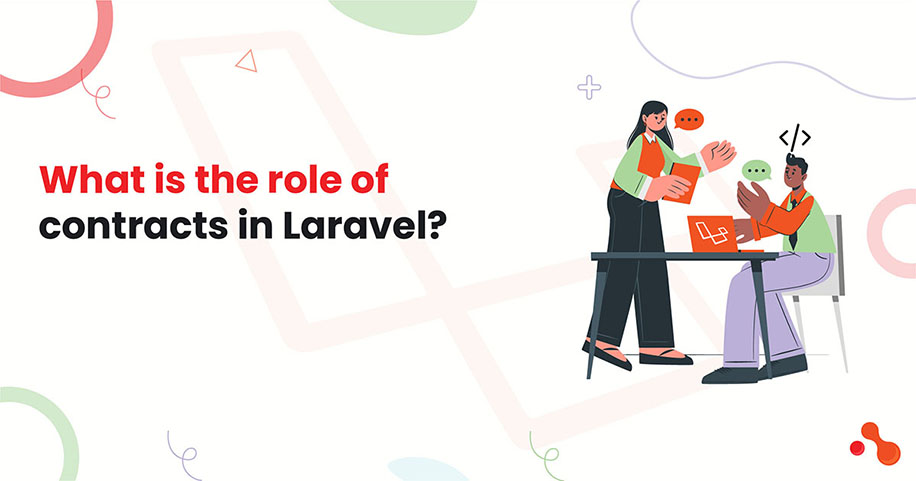Table of Contents
What is the role of contracts in Laravel?

Introduction
Contracts in Laravel are a set of interfaces which define the methods that a class must implement. These interfaces serve as a blueprint for classes, ensuring that they adhere to a specific set of rules. Moreover, the contracts play an important role in promoting consistency and maintainability within the ecosystem of Laravel. They form a crucial part of modern Laravel Development Services, helping developers build structured, scalable, and maintainable applications efficiently.
Now, let us begin by understanding What are Laravel Contracts?
What are Laravel Contracts?
Laravel contracts are not just a set of interfaces but it represents a fundamental design principle which emphasizes decoupling and interoperability. By defining a clear set of expectations for how classes should behave, contracts enable developers to build applications that are easier to understand and modify.
This modular approach enables better collaboration among teams and simplifies the integration of any third-party package.
Now, further let us talk about few key concepts related to Contracts
.jpg)
Contracts vs Interfaces
While all contracts in Laravel are interfaces, the term “contract” emphasizes its role in defining a specific behavior expected from implementations. This distinction helps them clarify their purpose within the Laravel ecosystem.
Service Providers
Contracts are often utilized in conjunction with service providers, which are responsible for binding implementations to contracts within the service container. This allows for easy resolution of dependencies throughout the application.
Now, further let us understand the Practical Use cases of Contractors
Practical Use cases of Contractors

Testing
Contracts facilitate testing by enabling developers to create mock implementations. This is particularly helpful in unit tests where users can substitute real implementation with a mock which adheres to the same contract, thus enabling a controlled testing environment.
Custom Implementations
Developers can create their own implementations of Laravel contracts for specific use cases, such as custom logging or queue processing mechanisms. This flexibility allows for tailored solutions while still adhering to the framework's standards.
Example of a Contract
Let’s take a look at a simple example.
Laravel offers a Iluminat\Contracts\Queue\Queue contract, which states methods that a queue driver must implement.
This includes methods like push, pushRaw, later and more.
Code
// Illuminate\Contracts\Queue\Queue.php
interface Queue
{
public function push($job, $data = '', $queue = null);
public function pushRaw($payload, $queue = null, array $options = []);
public function later($delay, $job, $data = '', $queue = null);
// Other methods...
}Classes which implement this contract, like Illuminate\Queue\RedisQueue, must offer concrete implementations for each of these methods.
Implementation in Laravel
In laravel, implementations are a concrete class which fulfills the requirements of the contract. These classes offer the actual logic behind the methods declared inside the contract. Implementations are the driving forces of Laravel framework which allows an interchangeable component that can be swapped seamlessly.
Example of Implementation
Continuing with the Queue example, let’s understand an implementation.
Laravel integrates with multiple queue drivers, one of which is RadisQueue. This class implements the Queue contract and offers the functionality needed by the contract’s methods.
Code
// Illuminate\Queue\RedisQueue.php
class RedisQueue implements Queue
{
public function push($job, $data = '', $queue = null)
{
// Implementation for push method using Redis
}
public function pushRaw($payload, $queue = null, array $options = [])
{
// Implementation for pushRaw method using Redis
}
public function later($delay, $job, $data = '', $queue = null)
{
// Implementation for later method using Redis
}
// Other implementations...
}By abiding to the Queue contracts, Laravel ensures that various queue drivers can be used interchangeably in the application, thus offering flexibility and ease of maintenance.
Now, let us understand a few additional usage scenarios of Contracts in Laravel
Additional Usage Scenarios of Contracts in Laravel
Loose Coupling
Contracts promote loose coupling between components, thus making it easy to change and replace parts of an application without affecting others.
Documentation and Clarity
Each contract serves as documentation for what a class is expected to do, aiding in onboarding new developers and maintaining code clarity.
Community Standards
By following established contracts, developers contribute to a shared understanding and standardization across different Laravel applications thus enhancing community collaboration.
Now, let’s understand the benefits of Contracts and Implementation
Pros of Contracts and Implementation
Consistency and Standardization
Contracts establish a set of rules that implementations must follow, promoting a standardized structure across different components of the framework.
Interchangeability
With contracts, developers can switch between different implementations seamlessly. This is particularly valuable when you are using external packages or custom components.
Easier Maintenance
Contacts make code more manageable and maintainable by clearly defining the expected behavior of classes. This would make it easy for developers to understand, extend or modify the existing code.
Dependency Injection
Contracts play an important role in Laravel’s dependency injection system. By injecting dependencies via their contracts, Laravel manages to keep components decoupled and easily testable.
Further, let us understand how you can use Contracts in Laravel?
How to use Contracts in Laravel?
To use a contract in Laravel you can either type-hint the contract in a class constructor or resolve it from the service container. Laravel’s service container automatically injects the appropriate implementation based on the contract.
Example of Using a Contract
Code
use Illuminate\Contracts\Queue\Queue;
class MyQueueProcessor
{
protected $queue;
public function __construct(Queue $queue)
{
$this->queue = $queue;
}
public function process()
{
// Use the queue contract methods
$this->queue->push('myJob');
}
}In the example, MyQueryProcessor can work with any implementation of the Queue contract, thus allowing for flexibility and testability.
Wrapping Up!
Contracts and implementations are important to the architecture of Laravel, thus offering a foundation for consistency, flexibility, and maintainability. By embracing these concepts, Laravel encourages a development environment where developers can seamlessly integrate and interchange components which ultimately leads to a more scalable and efficient application. Businesses often hire Laravel developers to leverage this architecture for creating reliable and high-performing web solutions.
Understanding contracts in Laravel opens up new possibilities for building modular and extensible software. As you dig deeper into Laravel’s ecosystem, you’ll find how these concepts can be applied across various components to enhance performance, especially when integrating modern innovations like Laravel AI development, which adds intelligence and automation to applications.
Frequently Asked Questions
Q: What are contracts in Laravel?
Contracts in Laravel are a set of interfaces that define the methods a class must implement. They serve as a blueprint for classes, ensuring that different implementations adhere to a specific set of rules. This promotes consistency, maintainability, and flexibility within the Laravel ecosystem.
Q: How do contracts enhance the flexibility of my application?
Contracts allow developers to swap out implementations without changing the code that depends on them. For example, if you have a contract for a queue service, you can easily switch from one queue driver (like Redis) to another (like Beanstalkd) without modifying the business logic that utilizes the queue. This interchangeability makes it easier to adapt your application to different requirements or environments.
Q: Can I create my own contracts in Laravel?
Yes, you can create your own contracts in Laravel. To do this, define an interface that outlines the methods your implementation should provide. Then, create concrete classes that implement this interface. This allows you to enforce specific behaviors and maintain consistency across your application.
Q: How do I use contracts with dependency injection in Laravel?
In Laravel, you can use contracts with dependency injection by type-hinting the contract interface in your class constructor. The Laravel service container will automatically resolve the appropriate implementation when creating an instance of your class. For example:
php
use Illuminate\Contracts\Queue\Queue;
class MyQueueProcessor
{
protected $queue;
public function __construct(Queue $queue)
{
$this->queue = $queue;
}
public function process()
{
$this->queue->push('myJob');
}
}Q: What are some common contracts provided by Laravel?
Laravel provides several built-in contracts for various components of the framework. Some common contracts include:
Illuminate\Contracts\Queue\Queue: Defines methods for queue operations.
Illuminate\Contracts\Cache\Repository: Provides methods for caching.
Illuminate\Contracts\Auth\Guard: Outlines methods for user authentication.
Illuminate\Contracts\Mail\Mailable: Specifies methods for sending emails.
Illuminate\Contracts\Routing\ResponseFactory: Defines methods for generating HTTP responses.
